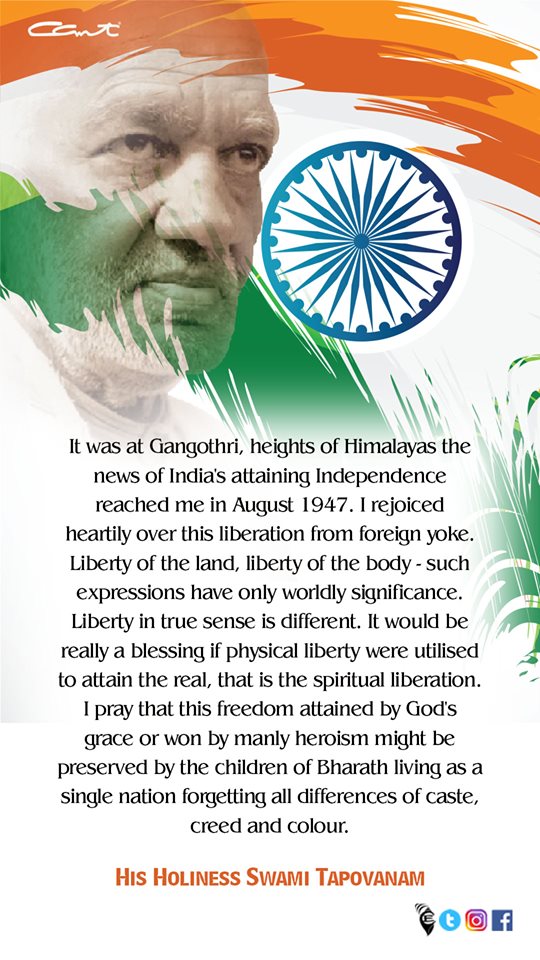#Ancient Culture ( Samskaram ) of Bharatham-4.10. : Swami Krishnananda.
----------------------------------------------------------------
# OPINION : Thursday, October 08, 2020. 7:34. AM. - 2261.
#Chapter- 4.The Fourfold Aim of Existence and How to Achieve It-10.
----------------------------------------------------------------
1.
This is prevented by the rules and regulations of brahmacharya wherein, at least for the period of 20 to 25 years, it becomes incumbent on the student to conserve energy. A system of this conservation of energy has evolved by which the brahmacharin, or the student, is not allowed to indulge in anything that is sensory, and is also not permitted to brood over objects of sense mentally. So for 20 or 25 years – nowadays it is less in number, but originally for the first 25 years, at least, one should live a life of intense self-conserving discipline.
2.
Whatever you have been in your young age will tell upon you when you are old. This is something you must remember. What did you do when you were young? Did you live a dissipated life, an indulgent life, a distracted life, an uncontrolled life? Its effect you will feel when you are old. When you are young, you may not know what you are doing. Everything looks like milk and honey. Little boys do not know the harm that they are bringing upon themselves by living a dissipated life of distraction and mental indulgence in objects. If you want to live a long life and have a strong-bodied existence even in old age, not be drooping and coughing and suffering, your young age should be lived in a disciplined manner. Therefore, the first period of one’s life is brahmacharya, the period of discipline, wherein the energy is conserved for the other performances which are required to be undergone subsequently through the stages of grihastha, vanaprastha and sannyasa.
3.
Grihastha dharma is what is known as family life, generally speaking. It is also a very difficult life. It does not mean that the disciplined brahmacharin suddenly becomes indulgent when he becomes a householder. That is not so. It is another kind of discipline altogether. All the four stages are stages of discipline only, but they are different kinds of discipline. It does not mean that in the grihastha stage you have got a long rope, whereas in brahmacharya you are all controlled. Nothing of the kind. Many a time you will feel that the life of a grihastha is more difficult, disciplined and controlled than even the brahmacharins because you are actually in contact with things in the world in front of you while living a life of conservation and discipline. The brahmacharin has lesser difficulties; the grihastha has greater difficulties. Therefore, the discipline that the grihastha has to undergo in terms of the encumberments in which he is involved is much greater.
4.
The grihastha is a person who holds the house. That is the meaning of grihastha: one who resides in the house, and the other ashramas are supposed to be dependent on him. The brahmacharin, the vanaprastha, the sannyasin are taken care of by the grihastha. In one of the sutras or aphorisms of the Brahmasutra, the grihastha dharma is considered as an integrated existence. Grishasta is the word used there because all-round discipline is necessary in the grihastha dharma, whereas a unilateral type of discipline is required in other stages of life. The physical, psychological and social disciplines required of the householder are more difficult to practice than the ones that are before the brahmacharin, the vanaprastha or the sannyasin.
5.
The daily routine of the grihastha is more variegated and complicated than the duties of a brahmacharin, vanaprastha or sannyasin. The pancha mahayajnas, as they are called, the five great sacrifices which a householder has to perform every day, are very important to make note of. He has to offer his daily worship to the gods who are not only superintending over our sense organs and controlling them, but are taking care of us. The higher divinities in heaven are the superintending powers which are lodged in our various sense organs, and if these divinities are not to operate, we would not see, we would not hear, we would not think, we would not have any consciousness of our existence. Surya, Aditya, the sun god, is the superintending power over our eyes. The Ashwinis as celestials are the determining factors of our organ of smelling. Varuna is the deity superintending over taste in the tongue. The quarters of the skies, called Dig devatas, are the deities which regulate our hearing organ, and Vayu devata, the wind God, is the power superintending over the sense of touch. The moon determines the mind, Brahma determines the intellect, Vishnu determines the subconscious or the memory, and Rudra decides the fate of our egoism. These are some of the gods who are daily worshipped by the grihastha in a particular ritual called deva yajna – yajna, offering made to the gods.
To be continued ...
===============================================================










Comments
Post a Comment